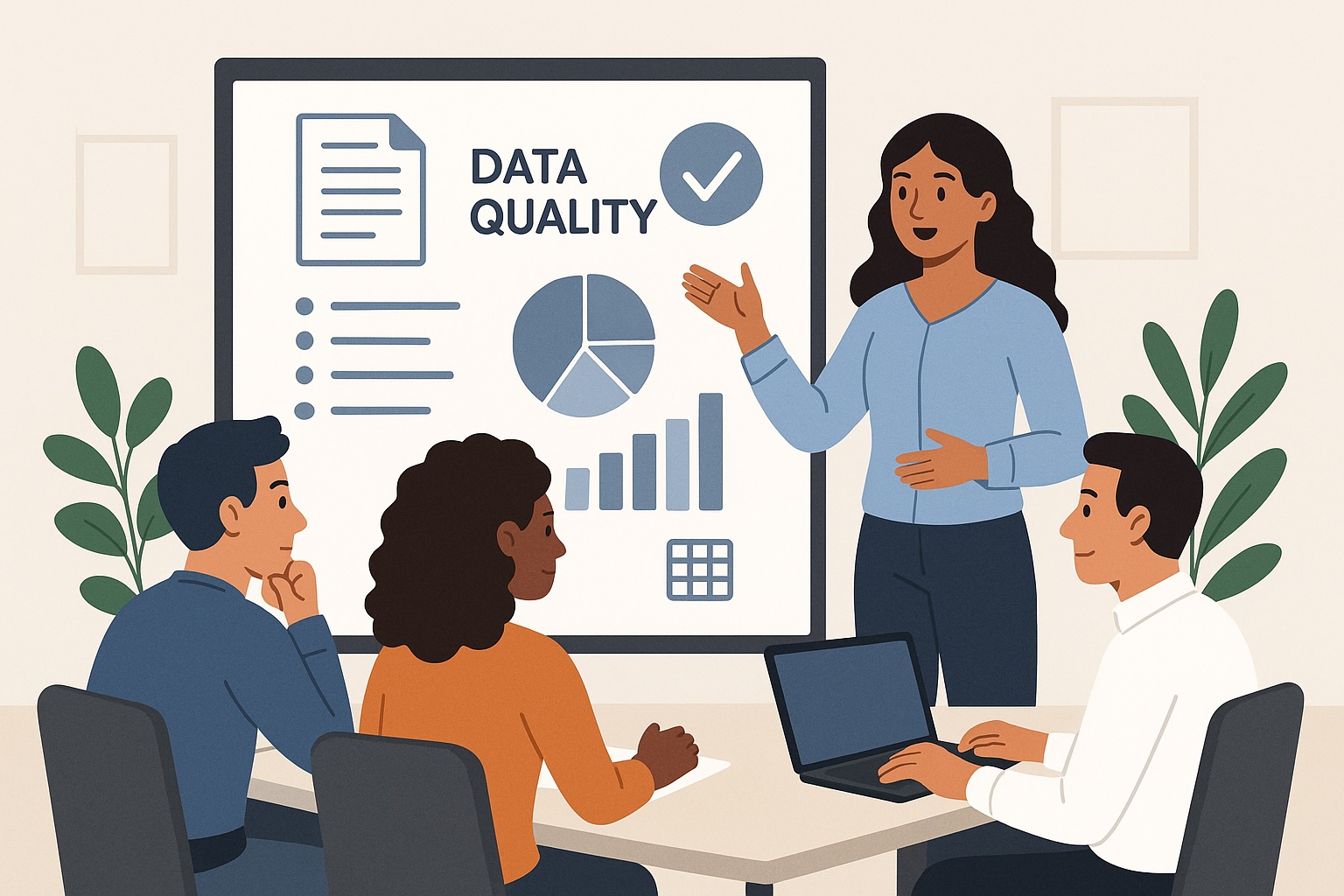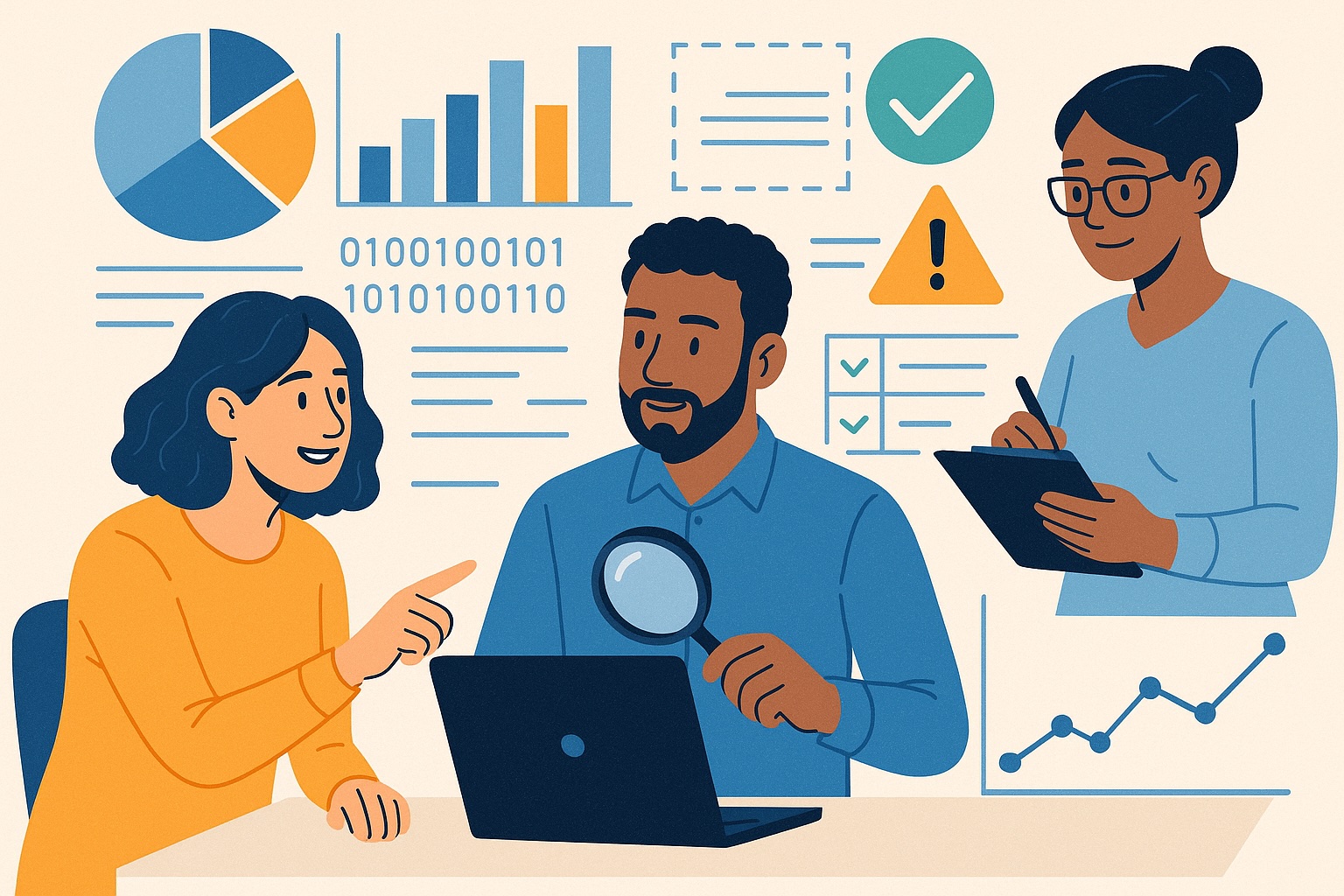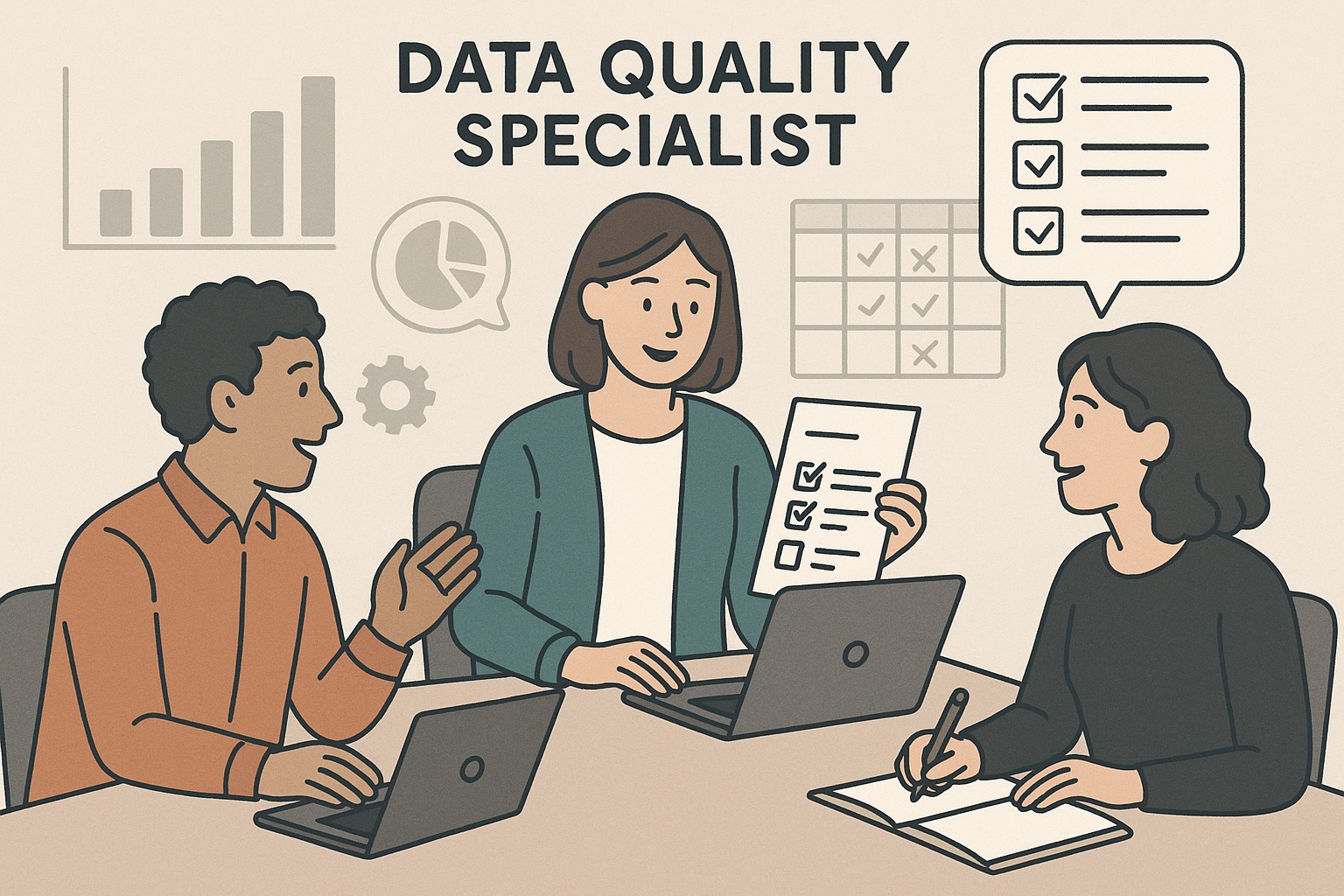What does a Data Quality Specialist do?
A Data Quality Specialist is responsible for ensuring, improving, and monitoring the quality and reliability of data within an organization. In an era where data-driven decision-making is crucial for success, this role plays a key part in preventing errors, increasing efficiency, and building trust in data.
Data Quality Specialists work closely with data engineers, analysts, IT teams, and business stakeholders to ensure that data is accurate, complete, consistent, and up-to-date. Depending on the industry, they may focus on customer data, financial records, operational systems, or analytical platforms.
What does a Data Quality Specialist do?
The work of a Data Quality Specialist is broad and focuses on both analysis and process improvement. The main tasks include:
- Developing and implementing data quality policies, standards, and procedures aligned with the organization’s goals.
- Analyzing datasets to detect and resolve errors, inconsistencies, duplicates, and missing information.
- Setting up data quality monitoring using tools (such as Talend, Informatica, Collibra, or Power BI) to maintain continuous insight into data quality indicators.
- Collaborating with data stewards, governance teams, and operational departments to embed data quality sustainably into systems and processes.
- Reporting on data quality and providing concrete improvement recommendations to management and other stakeholders.
- Training and supporting colleagues in identifying data quality issues and following proper data quality guidelines.
Importance of data quality in modern organizations
Good data quality is essential for reliable analyses, risk management, customer satisfaction, and compliance. Poor data can lead to bad decisions, inefficient processes, or even fines for non-compliance. Data Quality Specialists help organizations minimize these risks.
Where do Data Quality Specialists work?
These specialists are active in various sectors such as financial services, government, healthcare, retail, logistics, and industry. Both large organizations with complex data structures and medium-sized companies that are professionalizing in data governance rely on their expertise.
Required skills and tools
In addition to analytical skills and attention to detail, communication skills are important: a Data Quality Specialist must be able to bridge technical and non-technical teams. Commonly requested tools and knowledge areas include:
- SQL and Python for data exploration and validation
- ETL tools such as Talend or Informatica
- Data profiling and cleansing tools
- Data quality dashboards in BI platforms such as Power BI or Tableau
- Knowledge of data governance frameworks such as DAMA-DMBOK or GDPR compliance
Why pursue a career as a Data Quality Specialist?
The role of Data Quality Specialist offers intellectual depth, societal relevance, and strong career prospects. With the growing reliance on reliable data across all sectors, the demand for specialists in this field is rapidly increasing. It’s a profession with impact, where you directly contribute to the quality of decision-making within an organization.

Job Profile of a Data Quality Specialist
What Does a Data Quality Specialist Do?
A Data Quality Specialist plays a crucial role within organizations that heavily rely on reliable and accurate data. This professional is responsible for monitoring, improving, and maintaining data quality, ensuring that analyses, reports, and decisions are based on consistent and correct information.
In sectors such as healthcare, finance, retail, government, and telecommunications, the role of a Data Quality Specialist is essential for the smooth operation of data-driven processes. The specialist works closely with data stewards, analysts, data engineers, and business stakeholders.
Typical Profile of a Data Quality Specialist:
- A relevant academic degree, such as computer science, data science, business administration, information science, or a related field.
- In-depth knowledge of data governance principles, data management, and data standards.
- Proven experience in analyzing, cleaning, enriching, and monitoring data within complex systems.
- Strong analytical skills and a keen eye for detail to identify and resolve data quality issues.
- Excellent communication skills, both verbal and written, to effectively convey insights and quality issues to both technical and non-technical stakeholders.
- Proficiency in using data quality tools such as data profiling, data cleansing, and data matching (e.g., Talend, Informatica, SAS Data Quality, or Microsoft Data Quality Services).
- Experience in defining data quality rules, setting up KPIs, and developing dashboards to provide insights into data quality.
- Knowledge of SQL, data warehousing, metadata management, and preferably experience with cloud platforms like Azure or AWS.
- Experience with project management methods (such as Agile or Scrum) and leading multidisciplinary teams in data quality projects.
Competencies and Personality
A good Data Quality Specialist is critical, precise, and thinks in terms of processes. He or she is proactive, knows how to set priorities, and performs well in an environment where data-driven work is central. Since data quality issues are often multidisciplinary in nature, collaboration with various departments is essential.
Career Opportunities
From the role of Data Quality Specialist, there are interesting career paths toward positions such as Data Governance Specialist, Lead Data Steward, Data Architect, or Chief Data Officer. The knowledge gained about data structures, governance, and quality provides an excellent foundation for strategic data roles within organizations.

Which tools does a Data Quality Specialist use?
Data cleaning tools
Data cleaning forms the foundation of high-quality data analysis. Tools such as Trifacta, OpenRefine, Data Ladder, and DataRobot assist in automatically cleaning datasets. They remove duplicates, correct inconsistencies, standardize data formats, and fill in missing values. Thanks to smart algorithms and user-friendly interfaces, Data Quality Specialists can work faster and more efficiently, even with large and complex data sources.
Data profiling tools
Data profiling tools such as Ataccama, Informatica Data Explorer, and IBM InfoSphere Information Analyzer are used to gain insights into the structure, content, and quality of datasets. They detect anomalies, inconsistencies, and hidden patterns, providing valuable information about the reliability of the data. These insights help organizations mitigate risks and prioritize data quality improvements.
Data quality management tools (DQM)
To manage data quality structurally, specialists use DQM tools such as Informatica Data Quality, IBM InfoSphere QualityStage, and Talend Data Quality. These tools support the setup of data quality rules, assign responsibility through data stewardship, and monitor data quality KPIs. They also integrate with data governance platforms and master data management systems to ensure consistency and compliance.
Database management systems (DBMS)
A Data Quality Specialist regularly works with SQL-based DBMS such as MySQL, PostgreSQL, and Oracle, as well as with NoSQL solutions like MongoDB or Cassandra. These systems are used to store, manage, and process large volumes of data. Modern DBMS support real-time processing, scalability, and integration with cloud platforms and big data solutions.
Data observability tools
Newer tools such as Monte Carlo, Bigeye, and Databand.io focus on data observability: actively monitoring data flows and pipelines to detect disruptions, delays, or data leaks early. For Data Quality Specialists, these tools complement traditional monitoring and help ensure reliable, timely, and complete data in dynamic environments.
Data visualization tools
Visualization tools such as Tableau, Power BI, Looker, and Qlik help make data quality tangible for stakeholders. They enable the presentation of quality metrics, trends, anomalies, and improvement actions in the form of dashboards and interactive reports. These visualizations promote transparency, faster decision-making, and better collaboration between business and IT.
Programming languages for data analysis and validation
Programming languages such as Python and R are intensively used for data analysis, validation, and cleaning. Libraries such as Pandas, NumPy, and SciPy in Python, and packages such as dplyr and ggplot2 in R, offer powerful capabilities for detecting and correcting data quality issues. Machine learning models for automatic quality detection are also frequently developed in these languages.

A Day in the Life of a Data Quality Specialist
08:30 – Start of the day: reviewing data integrity reports
The day begins with a cup of coffee and opening the data quality dashboards. The Data Quality Specialist reviews the most recent data integrity reports, which provide insight into aspects such as completeness, accuracy, consistency, and timeliness of the data. Tools like Informatica Data Quality, Talend, or Ataccama are used for this. Red flags – such as missing values or illogical data patterns – are immediately marked for further investigation.
09:30 – Daily stand-up with the data team
Together with data analysts, data engineers, and sometimes business stakeholders, the team discusses which data quality issues are most urgent. During this brief stand-up, it is determined who will handle which actions and what technical or organizational bottlenecks exist. The specialist shares his findings from the morning reports and sets the day’s priorities.
10:00 – Deep dive: analysis and problem solving
Next, the Data Quality Specialist delves deeper into the identified issues. For example: why are customer numbers missing in a new report? Are there problems with source connections or validation rules? He consults logs, scripts, and source files and collaborates with an engineer to revise ETL processes or correct mapping rules. This phase requires precision, logical thinking, and technical expertise.
12:00 – Short lunch break
A break from the screens – time for lunch with colleagues. During these informal moments, insights are often shared on how data quality impacts the business – from reporting to customer satisfaction.
13:00 – Validation of new data
After lunch, he focuses on validating recently imported datasets. Using scripts and tools, rules are applied to check whether the new data meets the agreed standards. Are phone number formats correct? Are birthdates logical and complete? Where necessary, he sets up new validation rules or refines existing checks.
14:30 – Working on improvement projects
The afternoon is often spent on improvement initiatives. Think of setting up a data quality dashboard, automating checks, or improving data standards within a new system. These projects require collaboration with IT and business units and contribute to the structural improvement of data quality.
16:00 – Knowledge sharing and training
Part of the time is also spent on knowledge sharing. For example, the specialist gives a short training session to a marketing team on the importance of correct data entry, or he writes documentation on data quality rules for the internal knowledge portal. This raises awareness within the organization and increases support for proper data management.
17:00 – Wrap-up and reporting
The day ends with updating progress in project tools like Jira or Confluence. He also documents any outstanding issues so the team can follow up on them the next day. For some projects, a brief summary is sent to the project manager or management. Then it’s time to wrap up – tomorrow brings a new day full of data quality challenges.

.nl_.jpeg" data-entity-uuid="9ee6e96d-d554-4b7b-853d-a9e77aefd821" data-entity-type="file" alt="Werken als Data Quality Specialist 4 - DataJobs.nl" width="401" height="267">
What does a Data Quality Specialist earn?
The salary of a Data Quality Specialist can vary greatly depending on experience, location, sector (such as government, healthcare, or commercial organizations), and the level of specialization in data governance, tooling, and compliance. Data Quality Specialists are crucial for organizations that value reliable, complete, and up-to-date data. They ensure that data quality is not an afterthought but a strategic pillar supporting decision-making, innovation, and compliance. Below is an overview of salary expectations based on different levels of experience.
Entry Level (Junior Data Quality Specialist)
A Junior Data Quality Specialist with up to two years of work experience typically earns between €2,800 and €3,400 per month. At this level, you often support data analysis, data cleansing, and perform validation checks under the guidance of more experienced colleagues. You work with tools such as Excel, SQL, and basic data profiling software, and gradually learn the principles of data quality management and data governance.
Mid-level (Data Quality Specialist)
A mid-level Data Quality Specialist with 3 to 6 years of experience earns on average between €3,400 and €4,300 per month. At this stage, you independently conduct data quality assessments, link insights to data sources and processes, and collaborate closely with data engineers, analysts, and compliance officers. You are familiar with tools like Informatica, Ataccama, Talend, and Power BI or Tableau. You often take the lead in data cleaning initiatives and advise on data quality standards.
Senior Level (Senior Data Quality Specialist)
A Senior Data Quality Specialist with more than 6 years of experience typically earns between €4,300 and €5,300 per month. You are responsible for developing organization-wide data quality strategies, ensuring compliance with legislation (such as GDPR), and establishing data standards and procedures. You have in-depth knowledge of data management frameworks (such as DAMA-DMBOK) and are involved in major transformation projects, such as implementing a central data hub or master data management solution.
Lead Data Quality Specialist / Data Governance Consultant
In roles such as Lead Data Quality Specialist or Data Governance Consultant, you work at a strategic level to design data quality frameworks within the organization. In these positions, salaries typically range between €5,300 and €6,500 per month. You conduct audits, define KPIs and DQ guidelines, and oversee multidisciplinary teams. You advise management and stakeholders and are a driving force behind data-driven cultural change.
Location and Sector
Salaries can be higher in the Randstad region and in sectors such as financial services, telecom, energy, and e-commerce, where data quality directly impacts customer processes and compliance. In the public sector, salaries are generally slightly lower, but employment benefits are often favorable.
Education and Skills
A Data Quality Specialist often has a background in data science, information management, business administration, or a technical study (Bachelor’s or Master’s level). Skills in data analysis (SQL, Python, R), data quality and profiling tools (such as Informatica, SAS Data Quality, Talend), and knowledge of privacy legislation (GDPR) are crucial. Soft skills like accuracy, critical thinking, and communication also significantly contribute to success in this role.
| Job Level | Experience | Monthly Salary (gross) |
|---|---|---|
| Junior Data Quality Specialist | 0–2 years | €2,800 – €3,400 |
| Data Quality Specialist (mid-level) | 3–6 years | €3,400 – €4,300 |
| Senior Data Quality Specialist | 6+ years | €4,300 – €5,300 |
| Lead Data Quality Specialist / Data Governance Consultant | Strategic / Specialist | €5,300 – €6,500 |
Career Path and Growth Opportunities as a Data Quality Specialist
Career Path and Growth Opportunities as a Data Quality Specialist
A career as a Data Quality Specialist offers plenty of opportunities for growth and development. In an era where reliable data is becoming increasingly important for organizations, the demand for specialists who can ensure and improve data quality has risen significantly. With the right combination of technical skills, analytical insight, and communication strength, you can shape your career step by step.
Advancing Within the Organization
As you gain more experience, you can move into roles with greater responsibility, such as Senior Data Quality Specialist or Data Quality Manager. In these positions, you are not only responsible for performing quality checks but also for setting up strategic data quality policies, managing teams, and overseeing data governance processes.
For professionals with a broad vision and leadership qualities, there is also a path toward an executive role such as Chief Data Officer (CDO). In this role, you are ultimately responsible for the organization’s entire data strategy.
Specializing in a Sector or Domain
Many Data Quality Specialists choose to specialize in a particular sector or domain. Think of sectors such as healthcare, financial services, government, or technology. Specializing by sector helps you build valuable domain knowledge, making you more relevant to specific employers or projects.
You can also specialize in specific areas, such as data integration, metadata management, or data validation. In addition, expertise in regulations like GDPR can set you apart as a specialist.
Working as an Independent Specialist or Consultant
If you're looking for more freedom, flexibility, and variety in your work, you can also work as an independent Data Quality Consultant. You’ll offer your expertise to various organizations, for example during temporary projects or the implementation of data quality improvements. This route allows you to experience many different environments and challenges in a short period of time.
Continuous Learning and Certification
The world of data is constantly evolving. Successful Data Quality Specialists therefore continuously invest in their own development. Think of training and certifications in areas such as data governance, data management frameworks (such as DAMA-DMBOK), and tools like Informatica, Talend, Collibra, or Microsoft Purview.
Additionally, keeping up with trends such as AI-driven data quality monitoring, automated data validation, and data observability is essential to remain competitive.
Conclusion
Whether you choose to deepen your expertise within a specific sector, advance to a leadership role, or take the leap into self-employment, the career path as a Data Quality Specialist is versatile, future-oriented, and full of growth potential. With a sharp eye for data and a proactive approach to learning, you can continue to stand out in a rapidly changing world.

Training and Certification for Data Quality Specialists
To be successful as a Data Quality Specialist, it is essential to continuously invest in your professional development. In a rapidly evolving data landscape where accuracy, reliability, and consistency of data are becoming increasingly important, certifications and training make a real difference. They enhance your knowledge, increase your value in the job market, and enable you to contribute strategically to data quality within an organization.
Academic background and foundational knowledge
Many Data Quality Specialists have a background in computer science, data science, business analytics, or information management. In addition, a basic understanding of data modeling, database structures, and data standards such as ISO 8000 or DAMA-DMBOK is of great importance. Employers value professionals who are not only technically skilled but also understand data governance and data policies.
Key certifications for Data Quality Specialists
There are several internationally recognized certifications specifically focused on data governance and data quality. These certificates help you deepen your knowledge and enhance your career opportunities.
Certified Data Management Professional (CDMP)
Offered by DAMA International, this certification focuses on building in-depth knowledge of data management, data quality, metadata, data governance, and master data management. The CDMP has different levels (Associate, Practitioner, and Master) and aligns well with professionals working with the DAMA-DMBOK framework.
IQCP – Information Quality Certified Professional
This certification, offered by the International Association for Information and Data Quality (IAIDQ), focuses on designing, implementing, and improving data quality programs. You'll learn how to measure data quality, set up processes for quality improvement, and engage stakeholders in quality initiatives.
CIQP – Certified Information Quality Professional
The CIQP certification primarily focuses on the technical aspects of data quality. Topics include data profiling, data cleansing, data matching, and defining data quality rules. This certification is particularly suitable for professionals working hands-on with data analysis and correction tools.
Practical training and tools
In addition to official certifications, there are also practical training programs and online courses available that focus on using tools such as Talend, Informatica Data Quality, Microsoft Purview, and open-source tools like OpenRefine. These trainings are often modular and suitable for both beginner and advanced specialists.
Benefits of certification and continuing education
By obtaining recognized certifications, you demonstrate that you possess up-to-date and validated knowledge. This not only increases your credibility with employers and clients but also boosts your chances of securing higher-level positions and specialized projects. Organizations are placing increasing value on demonstrable expertise in data quality, especially in sectors like government, healthcare, finance, and telecommunications.
By continuously investing in training and certification, you can play a key role as a Data Quality Specialist in improving data quality and the success of data-driven decision-making within organizations.

Networking and Industry Organizations
Membership in Professional Organizations such as DAMA and IAIDQ
For Data Quality Specialists, staying connected to the professional community is essential. Membership in leading professional organizations such as DAMA International (Data Management Association) and IAIDQ (International Association for Information and Data Quality) provides access to valuable resources such as whitepapers, frameworks, webinars, and conferences. These organizations help you stay up to date with the latest insights and international standards in data management and data quality.
By actively participating in these networks, you not only stay informed about the latest trends and best practices, but you also gain opportunities to share knowledge, learn from experts, and strengthen your professional reputation within the field.
The Power of Professional Networks
In addition to formal organizations, building a strong professional network plays a crucial role in your development as a Data Quality Specialist. Regular contact with peers in the field—through regional meetups, specialized workshops, or trade shows—helps you exchange practical experiences and stay informed about current challenges across different sectors. These connections can lead to interesting projects or new career opportunities.
Online Communities and Social Platforms
There are also plenty of online opportunities to network. Think of specialized LinkedIn groups, Slack communities, forums, and knowledge platforms where data and analytics professionals connect. Here, experiences are shared about data quality challenges, tools like data profiling software, and methodologies such as data lineage and master data management.
By actively participating in these online communities, you can connect with experts worldwide, ask questions, discuss current topics, and position yourself as a thought leader within your niche.
Stay Visible, Keep Learning
Networking isn’t just about gaining knowledge or contacts—it’s also about making yourself visible as a professional. By speaking at events, contributing to discussions in online groups, or publishing articles about your experiences as a Data Quality Specialist, you expand your reach and profile within the field.
This visibility not only increases your chances of landing interesting projects or roles but also contributes to the professionalization of the discipline as a whole.

Impact and Social Relevance
The Societal Relevance of the Data Quality Specialist
A Data Quality Specialist plays an essential role in ensuring the integrity, accuracy, and reliability of data. In an era where organizations increasingly rely on data-driven decision-making, the impact of this role is greater than ever. High-quality data forms the foundation for responsible choices, innovative applications, and societal progress.
Direct Impact on Decision-Making
The quality of data largely determines the effectiveness of strategic and operational decisions. Incorrect or incomplete data can lead to poor investments, inefficient processes, or even reputational damage. A Data Quality Specialist prevents this by proactively identifying errors, correcting inconsistencies, and implementing clear quality standards. In doing so, they directly support the success of the organization.
Reliable Data as the Foundation for Innovation
Data plays a key role in technological innovations such as artificial intelligence, automation, and predictive analytics. These applications are only as good as the data they are based on. The Data Quality Specialist ensures that algorithms and models are fed with clean, up-to-date, and consistent data – leading to better outcomes and reliable insights.
Societal Value and the Public Sector
The societal relevance also extends beyond the private sector. Government organizations can create more effective policies with reliable data, targeting issues such as poverty reduction, housing development, or climate adaptation. In healthcare, good data quality results in better diagnoses, more targeted treatments, and more efficient care delivery. In this way, the Data Quality Specialist helps enhance public services and strengthen societal trust.
Sustainability and Ethical Use of Data
In the context of sustainability and responsible business practices, data quality also plays a crucial role. Companies aiming for environmental or social goals need reliable data to measure performance, produce reports, and be accountable. By contributing to this, the Data Quality Specialist supports transparency and the ethical use of data.
Trust in a Data-Driven Society
In a world where citizens, consumers, and employees are increasingly confronted with data-driven systems, trust is vital. By ensuring the reliability and traceability of data, the Data Quality Specialist helps maintain that trust. This role thus contributes to a fairer, more efficient, and more transparent society.

Case Study: The Influence of a Data Quality Specialist
Background
At HealthInno, a leading innovator in health technology, data quality has played a crucial role since the company’s founding. The company develops smart health solutions, ranging from wearable sensors to AI-powered diagnostic tools. Due to the sensitive nature of these applications — which directly impact human lives — ensuring reliable and consistent data was not a luxury, but a necessity.
Despite their technological advancement, HealthInno struggled with diverse data sources and a lack of uniform quality standards. The result: delays in analysis, risks to patient safety, and uncertainty in product development.
The Challenge
HealthInno collected data from a wide range of sources: IoT devices in patients' homes, medical institutions, research databases, and collaborations with international partners. Each of these sources used different formats, standards, and validation rules. This created a fragmented data landscape where errors, gaps, and duplicate records undermined the quality of analytics.
The consequences were noticeable: clinical innovations progressed more slowly, product development frequently stalled, and the organization began facing compliance risks. It became clear that a structural approach was needed.
Approach of the Data Quality Specialist
Joris, appointed as Data Quality Specialist, took the lead in a comprehensive quality improvement initiative. His approach began with a thorough audit: he mapped all data flows and analyzed which bottlenecks recurred consistently. He used advanced profiling tools to detect patterns, anomalies, and inconsistencies.
He then designed and implemented an integrated data quality management system. This system established control points throughout the entire data chain, from intake to use in analytics. Thanks to automatic validations, real-time quality reports, and clear correction mechanisms, the error margin decreased significantly.
In addition, Joris developed organization-wide training sessions and guidelines, so colleagues from other teams could also learn how to contribute to reliable data in their own ways. His goal: to embed data quality into the company culture.
Result
Joris’s interventions led to a fundamental improvement in data quality at HealthInno. The datasets are now not only cleaner and more complete but also much easier to combine. Analyses are conducted faster and deliver more reliable insights. Innovation projects — such as training AI models for early diagnosis — now run more smoothly and with less risk.
Moreover, HealthInno now has greater control over compliance: audits are simpler due to consistent documentation, and the organization consistently meets stricter European regulations such as MDR and GDPR.
Joris’s case highlights the importance of a specialized approach to data quality. In a sector where data can literally save lives, his work is the silent force behind innovation, safety, and reliability.

Job Openings for Data Quality Specialists
View current job openings for data and analytics specialists on DataJobs.nl

Looking for a Data Quality Specialist?
For a small fee, you can easily post your job vacancies on our platform and reach our large, relevant network of data and analytics specialists. Applicants respond directly to you, without any third-party involvement.
On DataJobs.nl, we connect supply and demand in the data and analytics job market directly—without intermediaries. You won't find any vacancies from recruitment agencies here. Visitors can view all job postings for free and without an account, and apply directly.
View the options for posting vacancies here. Questions? Get in touch with us!

Op zoek naar een uitdaging in data & analytics?
Bekijk hier alle actuele kansen! See vacancies- What does a Data Quality Specialist do?
- Job Profile of a Data Quality Specialist
- Which tools does a Data Quality Specialist use?
- A Day in the Life of a Data Quality Specialist
- What does a Data Quality Specialist earn?
- Career Path and Growth Opportunities as a Data Quality Specialist
- Training and Certification for Data Quality Specialists
- Networking and Industry Organizations
- Impact and Social Relevance
- Case Study: The Influence of a Data Quality Specialist
- Job Openings for Data Quality Specialists
- Looking for a Data Quality Specialist?


